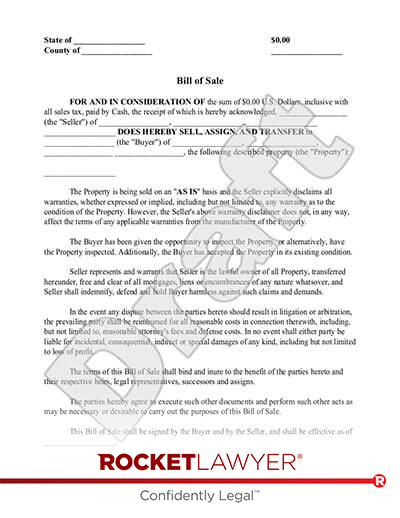Absolute Bill of Sale
A bill of sale is referred to as absolute when the property transfer is completed in total without any restrictions or payments due after the transaction is finished. For example, you can use an absolute bill of sale if you are buying a used car and paying for it in full at the time of transfer. Once the transaction is complete, you own the car and the seller has no right to it, and can make no further monetary demands.
As a legal document, both the absolute and conditional bill of sale should contain specific pieces of information, such as:
- Location of the property at the time of sale
- Names, addresses and signatures of all buyers and sellers involved in the transaction
- Effective date of the sale
- Property description, including identification number or serial number, if applicable
- Total amount of money that the buyer pays the seller, as agreed by both parties, including sales tax, if applicable
An absolute bill of sale also details the form of payment. For example, you may have paid a $1,000 down payment in cash and plan to pay the remaining balance of $3,000 by check. The document details these monetary amounts and payment types.
The condition of the personal property is also outlined in an absolute bill of sale. For example, when purchasing a boat "as is," the seller is offering no guarantees that it will continue to function properly, nor is he or she agreeing to take responsibility for future problems or injuries that may result from equipment malfunction. If an "as is" item breaks down after the transaction is complete, the seller does not owe you a refund, and is not responsible for repairs.
Conditional Bill of Sale
With a conditional bill of sale, ownership depends on meeting certain conditions. For example, if you borrowed money from a lender for the purchase of an item, the item remains in your possession as long as you make regular payments and honor the terms of your agreement. Failure to do so may result in the lender repossessing the item.
A conditional bill of sale may also be used to outline other requirements. For example, a puppy breeder may establish the condition that dogs be spayed or neutered at six months of age. Any breeding that occurs with the dog may be subject to a predetermined fee. Other requirements may include not giving the dog to an animal shelter and notifying the seller of the dog's new home address if given away.
Consider using an absolute bill of sale for transactions that involve payment in full for items in "as is" condition. Examples include making full payment to a private party for a car and selling a couch "as is" to a neighbor. A conditional bill of sale is ideal if specific criteria must be met; you might use it to sell puppies as a puppy breeder or buy a car on a payment plan from a private party.
This article contains general legal information and does not contain legal advice. Rocket Lawyer is not a law firm or a substitute for an attorney or law firm. The law is complex and changes often. For legal advice, please ask a lawyer.
